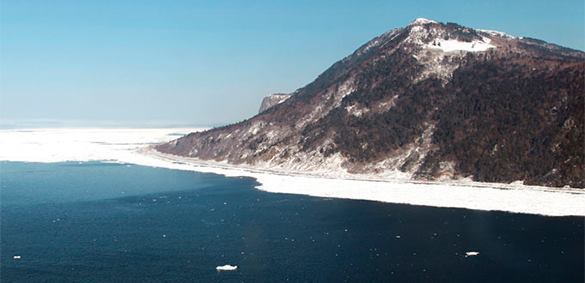Can Russia and Japan eat apple of discord?
After US Secretary of State Kerry paid a visit to Russia, Japanese Prime Minister Shinzo Abe evinced interest in Russia as well. It is an open secret that Japan follows Washington when it comes to foreign politics. Japanese Prime Mniister Abe demonstrates an intention to resume dialogue with Russia. However, Japan's dialogue with Russia is all about the Kuril Islands and the peace treaty. As Vladimir Putin said, "the puck is on the side of Japan." So what does Russia expect from Japan?

Japan does not recognize WWII results
In a nutshell, the problem is as follows. Russia says: "At first, we sign the peace treaty, and then we talk about the islands. Under the Soviet-Japanese Declaration from 1956, the Soviet Union agreed, as a gesture of goodwill, to hand over two of the Kuril Islands - Shikotan and Habomai - after the peace treaty was signed. Japan says: "You give us the islands first (Japan wants four islands to be returned, plus Iturup and Kunashir that became Russia's territory after 1945), and then we sign the peace treaty."
Japan will not get Kurils from Russia, no matter what
Russia's Foreign Minister Sergei Lavrov gave the following description of the talks with Japan. "We always ask the Japanese: "Gentlemen, do you acknowledge the results of the Second World War? "They answer: "We do, in general, but in this issue (of the South Kuril ridge) - we don't. "How did you ratify the UN Charter then? There is Article 107 there, according to which everything that victorious powers accomplished remains sacred and inviolable. This is the legal meaning of the article - don't touch anything," - Lavrov said on May 19 in an interview with the Rossiyskaya Gazeta. "We can say that Japan is the only country that calls the outcome of the Second World War into question - no one else does that," said Lavrov.
As of today, Russia and Japan have not changed their positions. The sides even exchanged unfriendly gestures. Tokyo joined all Western sanctions against Russia, while Russia refused entry to islands of Sakhalin ridge for relatives of Japanese nationals, who were killed in WWII. In addition, tensions in the Russian-Japanese relations have been strengthening against the backdrop of two geopolitical shifts. It primarily goes about the militarization of Japan and its rapprochement with the United States after the adoption of "new guidelines" in military cooperation. Secondly, Russia and China have been developing military and political ties speedily lately.
Russia and Japan as geopolitical foes
It is assumed that Japan will play a more active role in supporting Washington's military operations around the world and take part in the modernization of the US missile defense system in the Asia-Pacific region. Additionally, Russia and China will strengthen the military alliance in the framework though joint exercises, exports of state-of-the-art weapons to China, including S-400 air defense systems. Adequate statements are to be made at the SCO summit in July in Ufa. In a nutshell, Russian-Japanese relations are far from improving.
Japan's crocodile tears over Russia's Kuril Islands
Why does Tokyo want to resume the dialogue?
"There is a serious struggle going on in the Japanese leadership about the future of relations with Russia. This is why yesterday's meeting between Japanese Prime Minister Shinzo Abe and Russia's State Duma speaker Naryshkin was very short, only half an hour," - Alexei Maslov, the head of the School of Oriental Studies at the Higher School of Economics, Professor, Doctor of Historical Sciences told Pravda.Ru.
According to the expert, the United States does not want Japan to move closer to Russia, but Abe is trying to make some steps of his own. The expert does not rule out a possibility of talks on the two islands of the Sakhalin Islands. "Formally, the Russian position of 1956 has not changed, and Russia never said that it would never stick to the formula. However, while Japan insists on the transfer of four islands, further negotiations are impossible."
According to Alexei Maslov, Tokyo is resuming the dialogue with Russia because Japanese business circles are interested in restoring "powerful, large-scale economic relations between Russia and Japan."
Japan welcoming Putin with open arms, but not mind
Japanese newspaper Kyodo wrote of the same, albeit with a different connotation. "The Abe administration believes that the expansion of bilateral economic activity will make it possible for Russian President Putin to visit Japan this year. This move is seen as a key to advance the stalled negotiations on the return of four Hokkaido islands that Russia keeps," the newspaper wrote.
Japan wins hearts and minds of Russians on Kuril Islands
"Sooner or later, the meeting of Abe and Putin is to take place," State Duma Speaker Sergei Naryshkin said, after the meeting with the Japanese prime minister on Wednesday. According to the Russian official, Putin's visit to Japan should make a qualitative breakthrough in the bilateral relations. "We are ready to move forward, and we hope that Tokyo will find position on its plans," said Naryshkin.
"First and foremost, Russia is expecting a formal proposal from Japan to conclude a peace treaty. The Russian side expressed the idea decades ago. Secondly, Russia is waiting for certain proposals to expand economic cooperation, including in the region of the Far East. We also hope that Japan will pull out from the sanctions regime that will, of course, be a symbolic step for many countries," said Alexey Maslov.
"The treaty from 1956 was, in fact, a peace treaty, but Japan withdrew from it," - Victor Pavlyatenko, a leading researcher at the Japan Center of the Institute of Far Eastern Studies told Pravda.Ru. Japan ought to agree on the status quo, cross the line and move on."
Lyuba Lulko
Pravda.Ru
Read article on the Russian page of Pravda.Ru
Subscribe to Pravda.Ru Telegram channel, Facebook, RSS!





